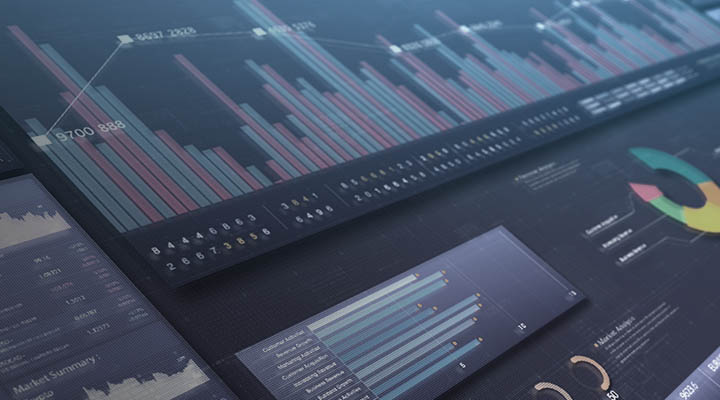Data is a ubiquitous resource within all organisations, created from every action and playing a pivotal role in informed decision-making. In contrast to conventional resources, which deplete on use, data proliferates with action. When an organisation utilises and manipulates data, it generates even more data, a perpetual expansion.
The monetisation of data is the process of profiting from data assets, which can encompass customer, operational, market, and other types of information. It transforms stored data into a valuable resource for financial gain.
Today, however, many organisations are undervaluing the true worth of their data, overlooking something that could revolutionise their approach to business strategies and decision-making. In this blog, we’ll look at how organisations can best understand and unlock the monetisation opportunities this ever-expanding resource.
The Importance of Properly Valuing Data
By 2030, it is estimated that the global market for data monetisation will reach US$15.5 billion. This means that organisations are sitting on troves of data with immense value if properly utilised and leveraged.
Harnessing the true potential of this data not only translates into significant financial gains for organisations, but also drives innovation, fuels economic growth, and enhances the well-being of society. However, to fully realise these benefits, organisations must first grasp the concept of data valuation and give it the importance it deserves.
Data valuation is the systematic process of determining the economic worth of an organisation’s data assets, a detailed assessment to judge its value in generating revenue, cutting costs, or providing substantial benefits. Grasping the true value of data is vital, significantly influencing an organisation’s overall functionality and success.
Here’s why data valuation is important:
Informed Decision-making: Accurate data valuation empowers organisations to make well-informed decisions. By assigning a monetary value to data, organisations can prioritise investments, allocate resources more efficiently, and devise strategies that align with their data’s worth.
Enhanced Operational Efficiency: Data valuation allows for a comprehensive understanding of data’s impact on operational efficiency. Organisations can streamline their processes, identify bottlenecks, and optimise operations based on the value each data asset brings to the table.
Competitive Edge in a Data-Driven World: In today’s increasingly data-centric business landscape, properly valuing data enables organisations to strategically position themselves through leveraging their data assets effectively. It helps in creating offerings that resonate with the market and respond to evolving consumer demands.
Assigning a tangible value to data moves beyond being a mere conceptual exercise. It is a fundamental shift in mindset that ensures data is treated with the importance it deserves. Without a concrete understanding of data's value, organisations risk treating it casually, potentially overlooking significant opportunities for growth and innovation
Ways In Which Data Can Be Monetised
A crucial aspect of the valuation process is understanding the ways in which data can be utilised to generate revenue, which could include some of the below:
Data Marketplaces: Organisations can create products from their data and make it available to interested parties for customer data or market research. The sheer volume and richness of this data can fetch substantial revenue.
Subscription Services: Data offered on a subscription basis is vital in sectors like finance, where real-time market updates offer a competitive edge. Subscriptions can turn into significant recurring revenue streams.
Data Analysis Services: Companies can provide data-derived insights to aid decision-making for other businesses. The demand for informed decision-making is on the rise, presenting a lucrative avenue for revenue generation.
Targeted Advertising: Online platforms can utilise user data for precise ad targeting, attracting advertisers and generating revenue through ad placements.
Product Enhancement: Data can be a catalyst for product and service enhancement, potentially boosting revenue through improved offerings that resonate with the target market.
Innovation: Data acts as a powerful tool to identify new opportunities, fuel product development, and open new markets. It can be the cornerstone of innovation and offer ground-breaking products and services.
Consultation: Expert data analysis services can help organisations understand their own data better, guiding them to make informed choices and optimise their operations. Consultation services can create significant revenue streams.
Research Reports: Organisations can compile and sell reports based on their data, offering valuable insights to businesses, policymakers, and researchers alike.
Data Licensing: Data can be licensed for specific purposes, particularly in highly regulated industries like healthcare or finance. Licensing agreements provide a structured way to monetise data while ensuring compliance with regulations.
What Organisations Must Do To Reap These Opportunities
Data monetisation is an extremely promising avenue for many organisations but it must be carried out with utmost care and ethical consideration. To reap these opportunities, they must navigate a complex landscape of legal, ethical, and technical challenges:
Data Ownership: Data ownership is a critical issue, especially when dealing with data that can be easily duplicated or copied. Clearly defining ownership and licensing terms is imperative to avoid unintended consequences and conflicts down the road. An unambiguous understanding of who holds the rights to the data and how it can be used is essential.
Privacy Laws: Respect for privacy laws is not merely a legal obligation but a moral imperative. Any data monetisation project should ensure that data is used in ways that don’t harm individuals or infringe their privacy rights.
Data Security and Protection: Robust security measures and protocols should be in place to mitigate risks and protect the integrity of the data. Equally, safeguarding data against unauthorised access, breaches, and cyber threats should be a top priority in data monetisation.
Legislation and Export Control: Compliance with legal frameworks is vitally important during data monetisation. Export control regulations, sanctions, and restrictions governing the transfer of data across international borders must be diligently adhered to. Failure to do so could result in severe legal consequences and reputational damage. In early 2023, Facebook’s owner, Meta, was fined a record €1.2bn over EU-US data transfers that breached rules that safeguard user information.
How BJSS Can Help
The value of data is undeniable. Organisations possess data teeming with vast opportunities that span the realms of sales, subscriptions, analytics, advertising, and ground-breaking innovation.
Nonetheless, the key to unlocking this wealth lies in the hands of organisations themselves. Overcoming the hurdles of legislation, privacy, ownership, security, and sovereignty can unlock limitless possibilities. Data monetisation is not just a much-hyped buzzword, it’s an urgent necessity.
For those eager to learn more, explore our Data & AI page.
Published
April 29, 2024Reading time
4 minutesRelated posts





